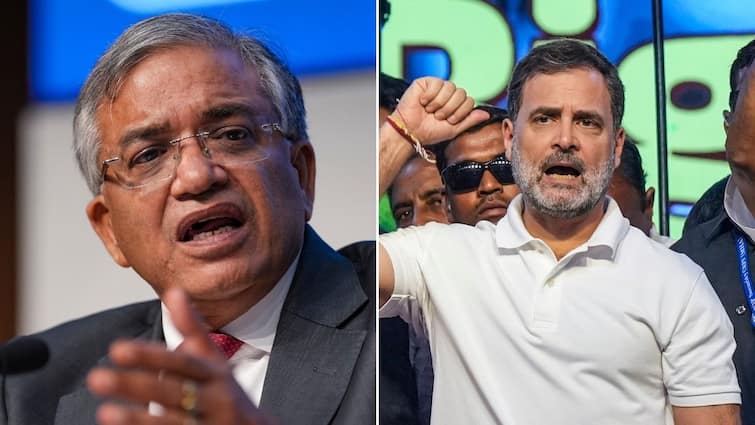Chief Election Commissioner Gyanesh Kumar on Sunday responded to the question about the EC giving notice to Rahul Gandhi over his claim of vote theft.
Addressing a press conference on Sunday, Kumar said that it cannot send notices to 1.5 lakh voters over the accusation of vote theft raised by the Congress MP.
“If a complaint comes in view of a voter, the ECI examines, but if accusation is about 1.5 lakh voters, then should we sent notices to 1.5 lakh voters without any evidence, or affidavit? Will voters not ask for evidence? Without any evidence, names of valid voters will not be cut,” Kumar said.
Without naming Gandhi, the CEC said, ” If one thinks, by giving a PPT, with wrong facts, the ECI will act, then it cannot act without the affidavit in such serious matter, it would be against the law and the constitution.”
VIDEO | When asked about the ECI asking for affidavit regarding the accusation of ‘vote theft’ issue, CEC Gyanesh Kumar says, “If a complaint comes in view of a voter, the ECI examines, but if accusation is about 1.5 lakh voters, then should we sent notices to 1.5 lakh voters… pic.twitter.com/6NKOUjdVb7
— Press Trust of India (@PTI_News) August 17, 2025
The poll panel hit back at Congress leader Rahul Gandhi, warning that such language undermines the Constitution and disrespects the democratic process. Kumar said terms like “vote chori” (vote theft) were not only inappropriate but also an attack on India’s voters. “The Election Commission is being used as a launchpad to target voters for political motives. We stand firmly with the voters,” he declared.
The CEC flanked by fellow Election Commissioners Sukhbir Singh Sandhu and Vivek Joshi, stressed that the poll body treats all political parties equally. “For us, there is no difference between the ruling party and the Opposition. Every party is the same. We will not step back from our constitutional responsibility,” he said.
The sharp rebuttal came on a day when Rahul Gandhi flagged off his ‘Voter Adhikar Yatra’ in Bihar, a campaign aimed at challenging the Commission over the Special Intensive Revision of electoral rolls in the poll-bound state.

